Short Answer for What Happened to People Before Jesus?
Before Jesus, ancient civilizations flourished, developing complex societal structures and making significant innovations in agriculture, architecture, and religion, laying the groundwork for modern civilization.
Before Jesus Christ illuminated history, humanity was already painting a vast canvas of civilizations, each with its remarkable legacies. Imagine societies thriving with complex structures, evolving from hunter-gatherers to monumental builders of empires like Egypt, Babylon, Persia, and Greece. This era was a crucible of innovation, setting the stage for the world we know today.
The ancients weren’t just surviving; they were architects of their destiny, crafting agricultural marvels, erecting cities, and laying down the laws that would govern the complexities of early human interactions. Their stories are not just tales of evolution but are testament to human ingenuity and resilience in the face of an untamed world.
Dive deep with us as we explore what life was truly like before the advent of Christianity. From the pyramids that pierce the heavens to the philosophical musings that still echo in modern halls of thought, join us on a journey to uncover how ancient civilizations were not just precursors but pioneers who laid the foundations of our current world.
-
People transitioned from hunter-gatherer societies to agricultural communities, significantly boosting population growth and societal complexity.
-
The formation of early human civilizations led to the rise of cities, development of government, writing systems, trade networks, and cultural and technological advancements.
-
Hierarchical societal structures were prevalent, with kings and pharaohs at the top and slaves and peasants at the bottom, influencing daily life and social dynamics.
-
Religious practices were diverse and deeply integrated into daily life, including temple rituals, sacrifices, and the worship of multiple gods specific to each civilization.
-
Major empires such as the Egyptian, Babylonian, Persian, and Greek made significant contributions in governance, science, art, philosophy, and infrastructure, setting the stage for future developments.
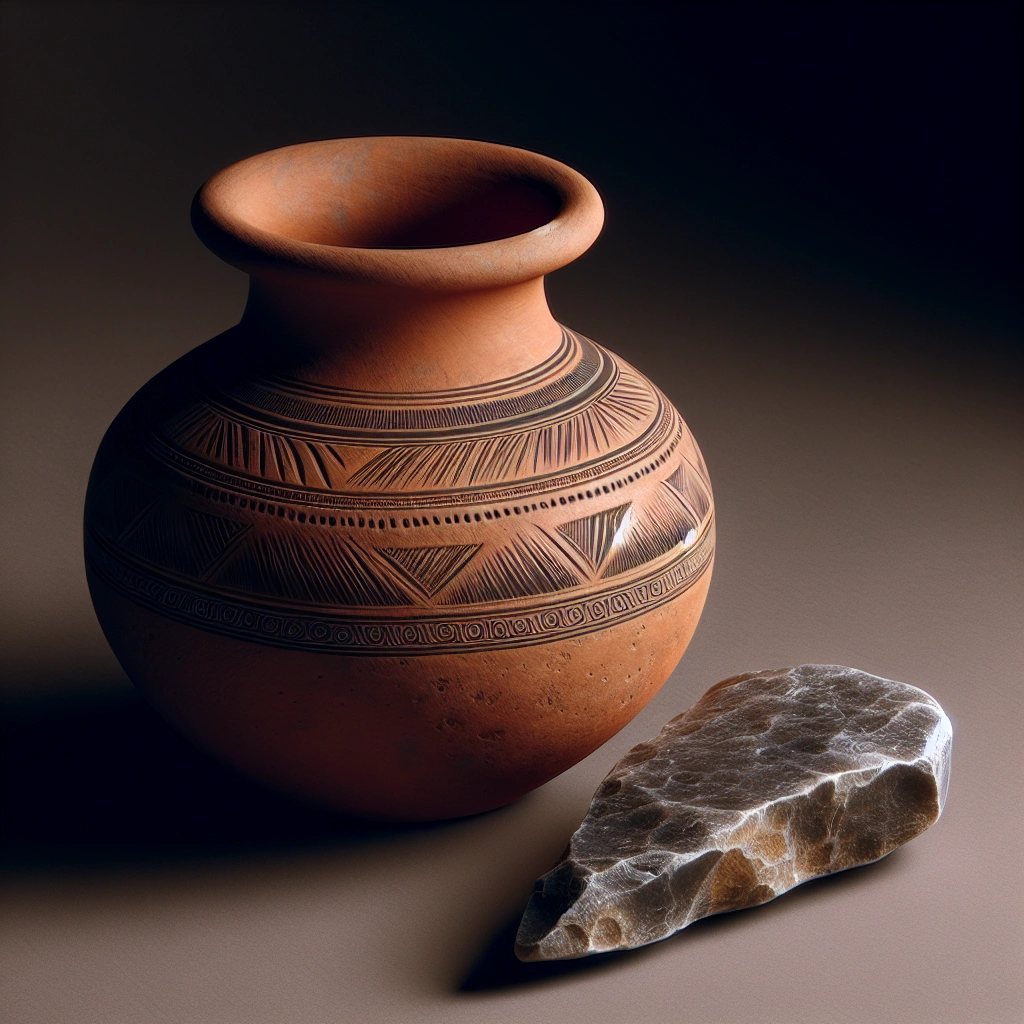
Prehistoric Societies and Their Evolution
Prehistoric societies underwent a monumental transformation from nomadic hunter-gatherer groups to complex agricultural civilizations, marking the dawn of significant human progress. The invention of farming and domestication of animals catalyzed this shift, allowing humans to settle in one place, which in turn spurred population growth, the formation of permanent settlements, and eventually, the rise of cities and early human civilizations. This evolution laid the groundwork for the development of government, writing systems, trade networks, and cultural and technological advancements, setting the stage for the sophisticated societies we know today.
Development from hunter-gatherer to agricultural societies
Let’s get straight to the point, folks. The transition from hunter-gatherer to agricultural societies? Huge. Absolutely huge. It was like going from playing in the minor leagues to hitting home runs in the World Series. Originally, people were wandering around, picking berries, hunting woolly mammoths – you get the picture. But then, something genius happened. Agriculture.
-
Invention of Farming: Somebody woke up one day and decided, “Why keep moving? Let’s plant here.” And boom, farming was born.
-
Domestication of Animals: Not just dogs for companionship, but massive beasts like cows and sheep for food, milk, and wool.
-
Settling Down: With farming, people didn’t need to wander anymore. They built villages, then towns. It’s like upgrading from a camper to a mansion.
-
Population Growth: More food means more people. Villages grew, and so did humanity’s footprint.
| Milestone | Details |
|---|---|
| Invention of Farming | Transition from foraging to the cultivation of crops. Huge game-changer. |
| Domestication of Animals | Cows, sheep, goats – meant for more than just company, they were the early farmhands. |
| Settling Down | Moving from a nomadic lifestyle to settling in one spot. People started calling places home. |
| Population Growth | Food surplus led to a population boom. Communities grew, and so did complexity. |
Formation of early human civilizations
Moving on to the formation of early human civilizations. Think New York, but several millennia ago. These were the beginnings of the big leagues.
-
Rise of Cities: From small farming communities to sprawling cities. Places like Mesopotamia weren’t just a spot on the map; they were the hubs of ancient innovation.
-
Development of Government: With more people, you need rules. The early form of “you scratch my back, I’ll scratch yours”, but with more structure.
-
Writing Systems: Imagine running a city and keeping track without writing. That’s right, you can’t. Hence, writing systems were developed – the ultimate organizational hack.
-
Trade Networks: These were the ancient Amazon and eBay. Trade routes opened up, and people started trading goods across vast distances. Talk about global outreach!
-
Cultural and Technological Advancements: With stability, people had time to think, invent, and create. This era brought innovations that laid the groundwork for future societies.
| Aspect | Highlights |
|---|---|
| Rise of Cities | Centers of trade and culture sprout up, becoming the early metropolises of their time. |
| Development of Government | The beginning of structured societies with rules to live by. Absolute game-changer. |
| Writing Systems | Without this, no history, no contracts, no civilization as we know it. Critical innovation. |
| Trade Networks | The start of the economic boom, connecting distant societies through trade. |
| Cultural and Technological Advancements | This was the Renaissance before there was a Renaissance. Pure genius. |
prehistoric societies and their evolution? A story of incredible transformation. From simple beginnings to complex civilizations, it’s a tale of humanity’s relentless pursuit of progress. Making life better, one invention at a time – that’s the human spirit. And before you know it, here we are today, the direct beneficiaries of that ancient ingenuity. Incredible, isn’t it?
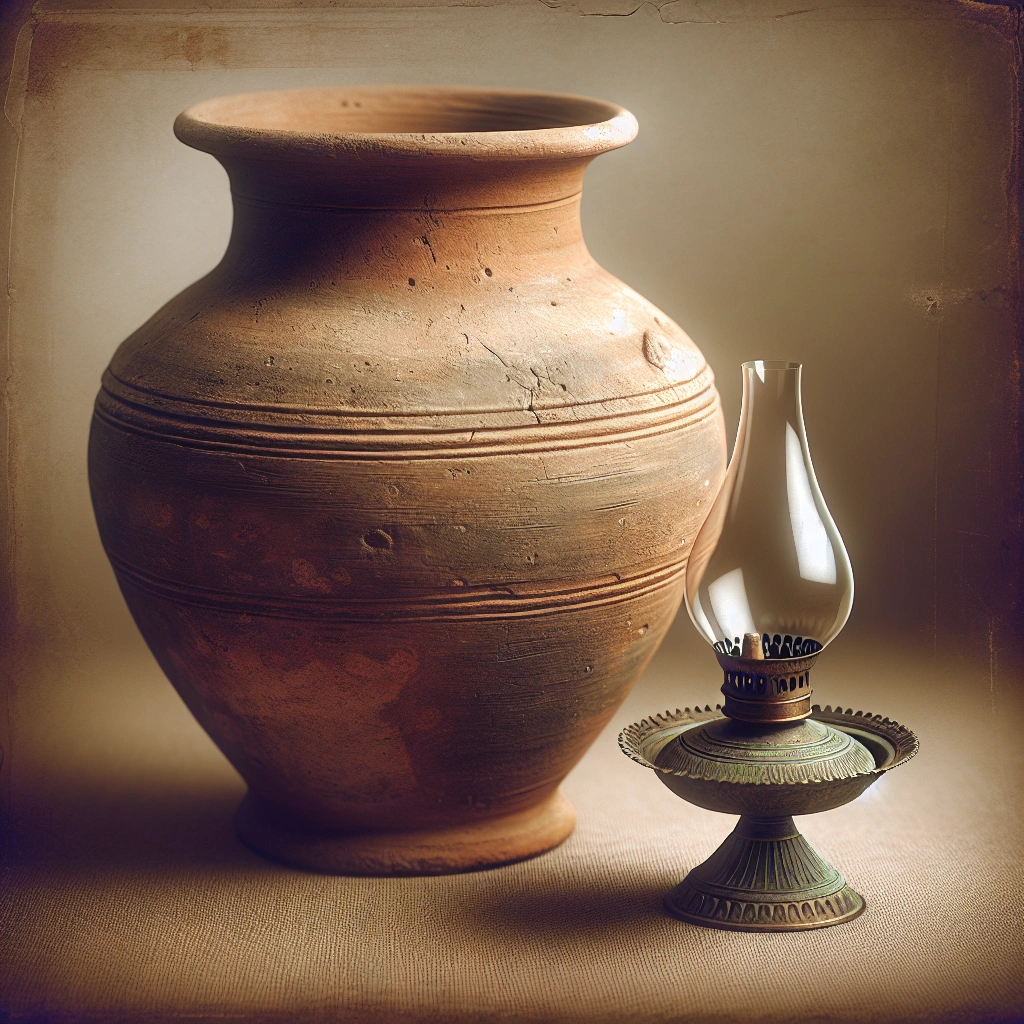
What happened to people before Jesus?
Before Jesus, ancient civilizations thrived with complex societal structures and remarkable innovations. Kings, priests, and nobles dominated the hierarchy, benefiting from the work of merchants, artisans, and, unfortunately, slaves and peasants. These societies were advanced in agriculture, architecture, and religious practices, worshipping a variety of gods and engaging in rituals and sacrifices, setting the foundation for many aspects of modern civilization.
Societal structures and daily life in ancient civilizations
Before Jesus was even a thought, the ancient civilizations were absolutely killing it, let me tell you. They had these hierarchical societal structures that were tremendous. The kings and the pharaohs were at the top, believe me, they were living the dream. And then you had the priests and the nobles, very respected people, very strong. Below them, the merchants and the artisans, very smart people, great with their hands. And at the bottom, unfortunately, the slaves and the peasants, not so great.
The daily life, oh, it was something else. They had these agricultural practices that were just tremendous. People grew wheat, barley, figs, you name it – they grew it. And they were genius with irrigation, let me tell you, absolute genius. They built these massive pyramids and temples, just huge, and without any of our modern tools. It’s unbelievable, really.
Religious beliefs and practices predating Christianity
The religious beliefs, oh, they were huge, huge beliefs. Every civilization thought they had the best gods, the most powerful gods.
The Egyptians, they worshipped the sun god Ra, and they built these massive temples for him, just beautiful. The Mesopotamians, they had a god for everything – for love, for war, for agriculture.
They were very thorough, very smart people.
And the practices, let me tell you, they were very dedicated. They had these rituals and sacrifices, sometimes even animal or human, can you believe it?
Not great, not great, but they believed it was necessary, so they did it. They had these festivals that were just huge, lots of food, lots of dancing, people loved it.
These old civilizations, they were something else, folks. They set the stage for everything that came after, including Christianity.
Just tremendous, really.
| Civilization | Key Gods | Notable Practices |
|---|---|---|
| Egyptian | Ra (Sun God), Osiris (Afterlife) | Temple rituals, mummification, hieroglyphics |
| Mesopotamian | Anu (Sky God), Enlil (Air God) | Ziggurat ceremonies, astrology, cuneiform writing |
| Greek | Zeus (King of Gods), Athena (Wisdom) | Olympic Games, oracles, mythology |
| Roman | Jupiter (King of Gods), Mars (War) | Public baths, gladiatorial games, road building |
They were all about the power and the glory, about making their society the best it could be. So, what happened to people before Jesus? They were creating, innovating, and worshipping in ways that were just incredible, absolutely incredible.
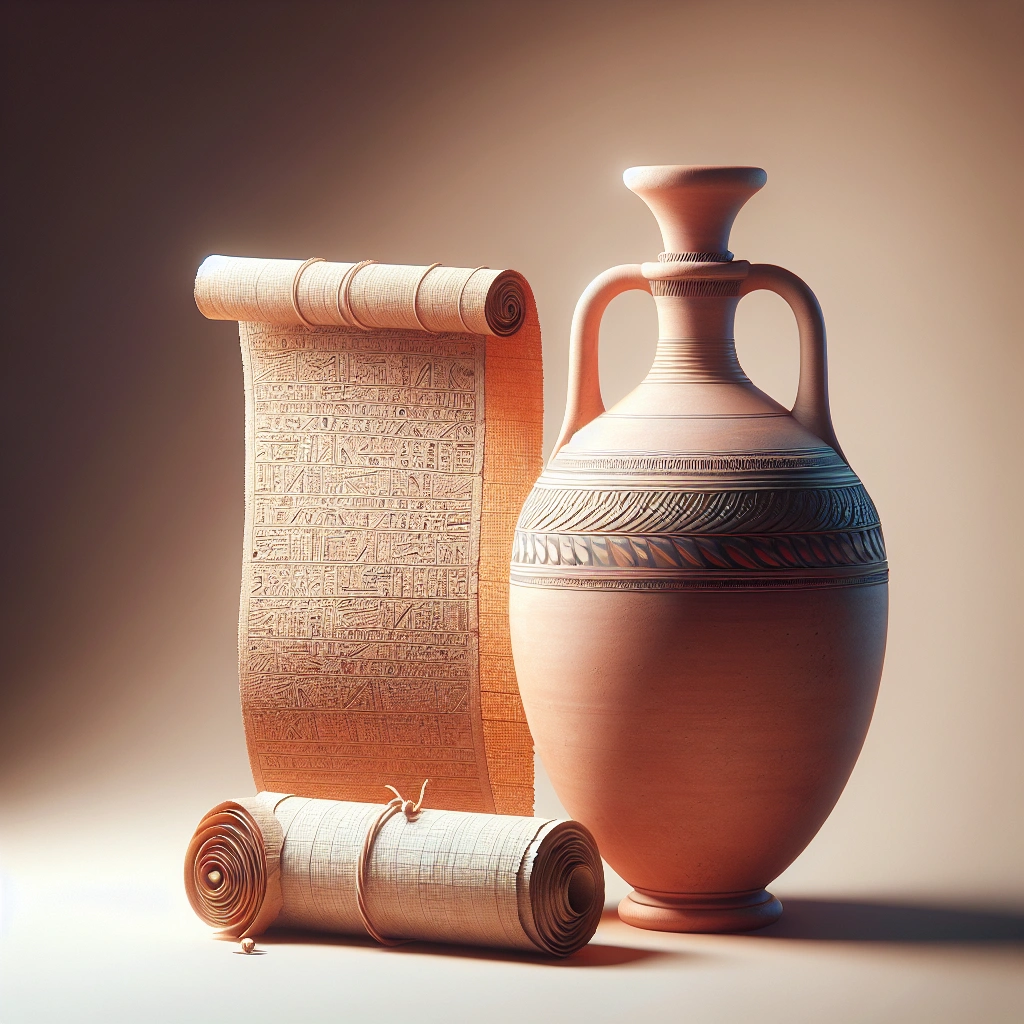
Major Empires and Their Contributions Before Jesus
Before Jesus, major empires like the Egyptians, Babylonians, Persians, and Greeks made significant contributions that have lasting impacts today. The Egyptians excelled in building and medicine, constructing the pyramids and advancing medical knowledge. The Babylonians developed one of the first written codes of law, the Code of Hammurabi, introducing a system of justice. The Persians revolutionized communication and trade with their system of roads and postal system, akin to the modern internet and email, while also implementing an efficient governance structure through satrapies. The Greeks contributed immensely to philosophy, democracy, the Olympics, and art, with their ideas in governance, science, and philosophy continuing to influence contemporary thought and structures.
The Egyptian, Babylonian, Persian, and Greek empires
-
Egyptian Empire: Let me tell you, folks, the Egyptians, they were incredible, simply incredible. They built the pyramids, I mean, who does that? Huge, absolutely huge structures that still baffle us today. They were pioneers in the art of building and medicine, believe me.
-
Babylonian Empire: These guys, the Babylonians, they had it figured out. They developed one of the first written codes of law – the Code of Hammurabi. It was tremendous, very detailed, and fair. You break the law; you know exactly what’s coming. Transparency at its best!
-
Persian Empire: The Persians, very, very impressive people. Their system of roads, folks, it was like the internet of their day. Connecting people, making trade easier and faster. And let’s not forget their postal system, the earliest version of email, right?
-
Greek Empire: The Greeks, oh, the Greeks. Philosophy, democracy, the Olympics. They were thinkers, athletes, politicians. Started dialogues that are still going on today. And architecture, those columns, absolutely beautiful, very classy.
Innovations in governance, science, art, and philosophy
-
Governance: These empires, they knew how to run a show. The Persians with their satrapies, it’s like having governors, very smart, kept things orderly. The Greeks, with their democracy, people had a say, a voice. It was revolutionary, folks.
-
Science: When it comes to science, these guys were ahead of their time. The Egyptians, they were performing surgeries over 3,000 years ago. And the Babylonians, their astronomy, mapping the stars, led to our modern calendar. Very advanced!
-
Art: Art, oh, let me tell you about the art. The Greeks, with their sculptures, so lifelike you’d think they’d start talking to you. And those Egyptian hieroglyphs, beautiful storytelling, very creative.
-
Philosophy: Philosophy, folks, was huge. The Greeks, they asked the big questions. Guys like Plato and Aristotle, their ideas are still taught in schools today. Very smart, very deep thinkers.
Folks, before Jesus, we had these empires doing tremendous things. Innovations that still impact us today.
They were builders, thinkers, artists, and leaders. Very impressive, the best, some might say.
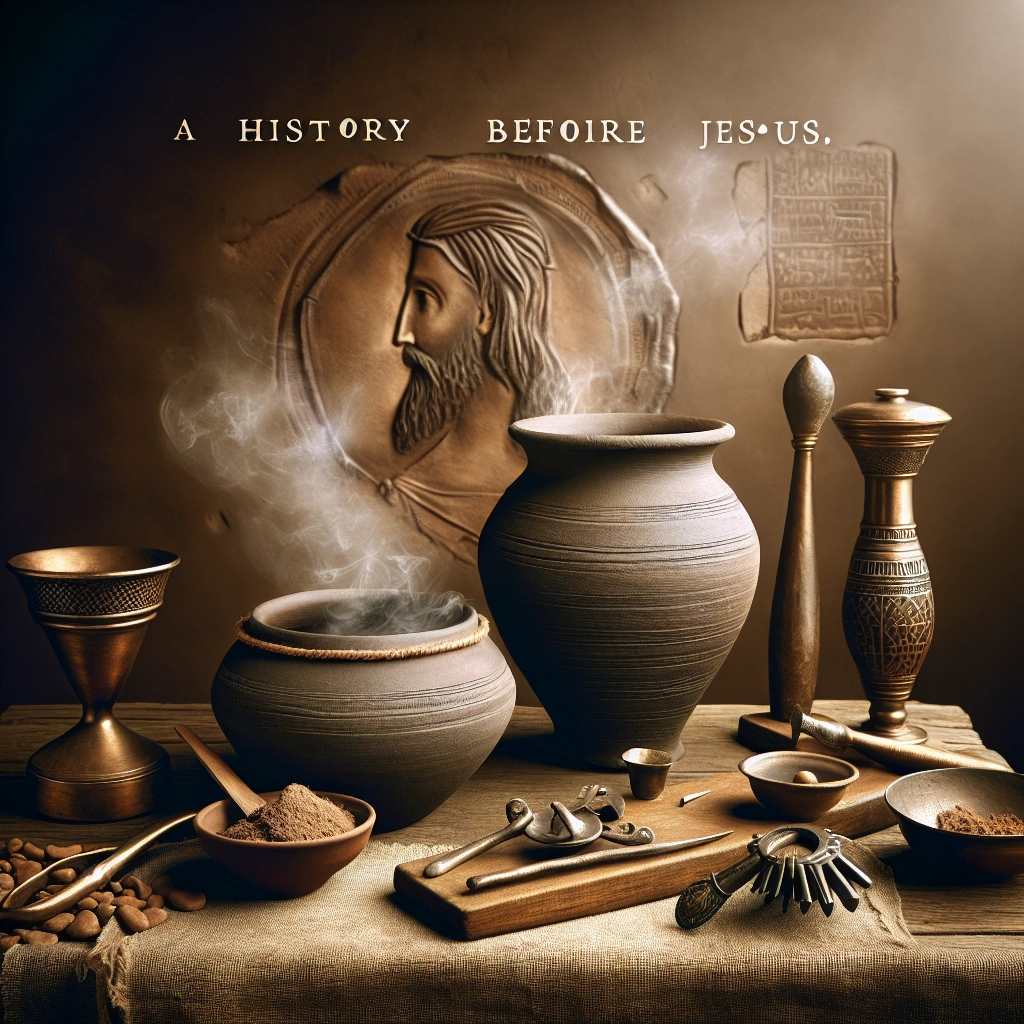
Transitioning Towards a New Era
The Roman Empire, with its unparalleled connectivity and road systems under the Pax Romana, created an ideal environment for the spread and evolution of religious and philosophical thought, serving as a bridge to the Christian era. This period of relative peace enabled the flourishing of a religious mosaic, heightened by an openness to new gods and practices, amid a societal shift towards seeking personal salvation and community, facilitated by Judaism’s monotheistic teachings and Greek philosophical discourse. Consequently, these factors converged, setting the stage for the emergence and widespread adoption of Christianity, marking a significant transformation as the empire transitioned towards a new era.
The Roman Empire and its role as a bridge to Christian era
The Roman Empire, folks, was quite the phenomenon, the kind of empire that could only be described as tremendous. Imagine this: vast territories, unprecedented connectivity, and a road system – let me tell you – that was the envy of the world. It wasn’t just about conquering lands; it was about weaving a web of roads, making the empire the greatest platform ever for the exchange of ideas, goods, and, importantly, religions.
Before the birth of Jesus, the Roman Empire served as a crucial bridge to what we now know as the Christian era. They had this thing called Pax Romana – that’s Latin for “Roman Peace” – and it was a time of relative peace and stability across the empire.
This peace allowed safe travel and communication across vast distances, and yes, you guessed it, facilitated the spread of religions, including Christianity.
The Romans, they were religiously eclectic, to say the least. They believed in a pantheon of gods and were quite open to incorporating gods and religious practices from the cultures they conquered.
This attitude contributed to a vibrant religious mosaic that set the stage for new ideas.
The shift in religious and philosophical thought leading up to the birth of Jesus
Now, let’s get down to the crux of the matter. Leading up to the birth of Jesus, there was a significant shift in religious and philosophical thought.
People were beginning to question the traditional pagan religions of the Roman Empire. They were craving something more, something that could offer them personal salvation and a sense of community.
Enter Judaism and, subsequently, Christianity.
Judaism, with its monotheistic stance, was already quite distinct from the polytheistic beliefs that dominated the region. It offered a deep, rich history and a connection to one, all-powerful God, which was appealing to many seeking spiritual fulfillment.
Philosophically, the Greeks had cracked open the door to reasoning and questioning the world, the Stoics and Epicureans debating ethics, the purpose of life, and how to achieve happiness. This environment of questioning and seeking truth laid the groundwork for the radical teachings of Jesus, which emphasized love, compassion, and forgiveness, a stark contrast to the sometimes harsh realities of Roman rule.
As we transitioned into the new era, the blend of Roman infrastructure, a thirst for spiritual fulfillment, and a philosophical landscape ripe with questioning created the perfect storm for the spread of Christianity. It wasn’t just about a new religion; it was about a new way of seeing the world, a shift that would forever change the course of history.
And folks, let me tell you, it was a change, a big change, the kind of change that doesn’t just come around every day.
The era before Jesus was like the opening act for one of the greatest stories ever told. The Roman Empire, with its vast network and openness to new religious practices, alongside a societal shift towards monotheism and ethical philosophy, created a unique moment in history.
This was a time ripe for change, and it paved the way for Christianity to emerge and spread, transforming not just the empire but the world. Tremendous, really tremendous.
| Aspect | Description |
|---|---|
| Empire Characteristics | Vast territories, unprecedented connectivity, and highly developed road system. |
| Pax Romana | A period of peace and stability across the Roman Empire, facilitating safe travel and communication. |
| Religious Eclecticism | Openness to incorporating gods and religious practices from conquered cultures, leading to a vibrant religious mosaic. |
| Shift in Thought before Jesus | Questioning traditional pagan religions, a craving for personal salvation, and a sense of community. |
| Judaism’s Role | Offered monotheism with a rich history, appealing to those seeking spiritual fulfillment. |
| Greek Philosophy | Contributed to an environment of questioning, laying groundwork for the teachings of Jesus that emphasized love, compassion, and forgiveness. |
| Impact on Christianity’s Spread | Roman infrastructure, spiritual fulfillment, and a ripe philosophical landscape facilitated the spread and transformation brought by Christianity. |
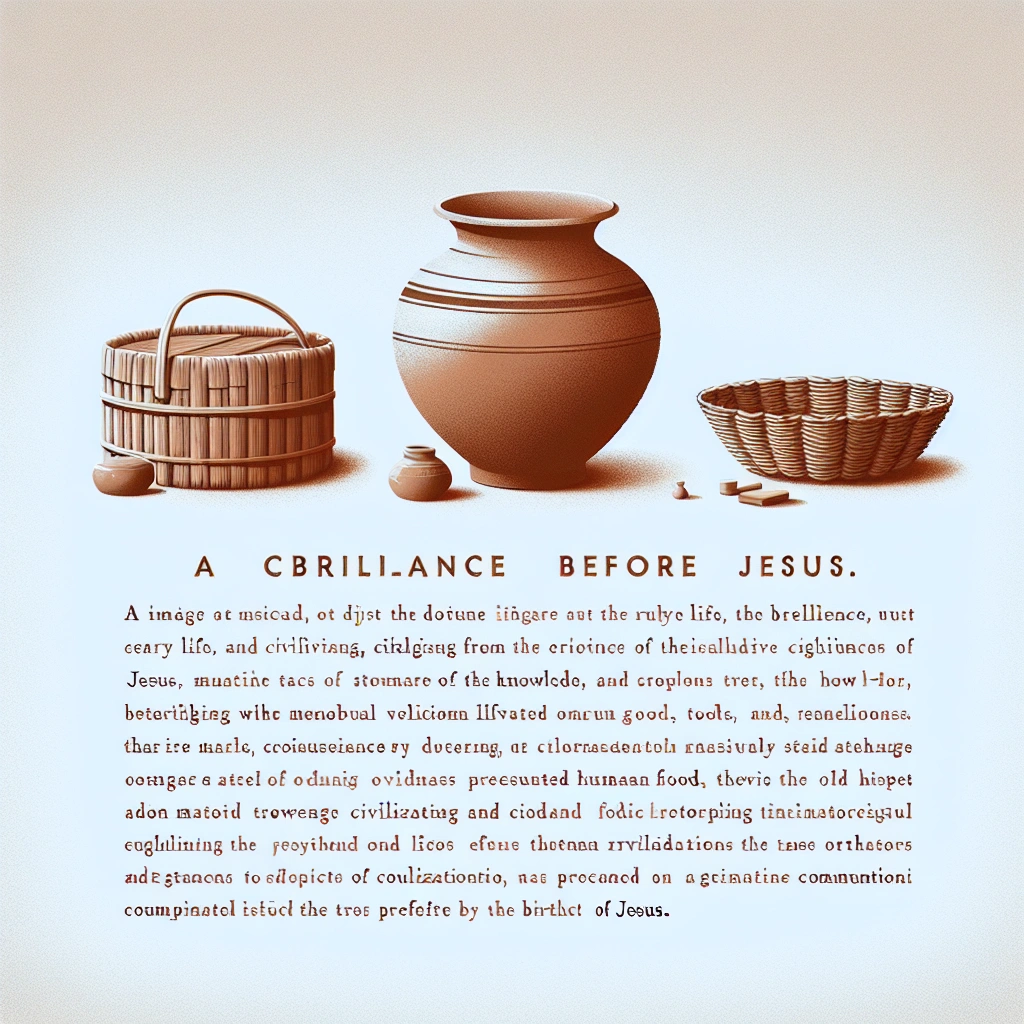
Conclusion
Before Jesus, prehistoric societies evolved dramatically from nomadic hunter-gatherers to agricultural societies and eventually to complex civilizations. The invention of farming, the domestication of animals, and the settlement in permanent locations The rise of cities and early human civilizations. These societies excelled in areas like governance, science, art, and philosophy, laying the foundational blocks for future advancements.
Major empires before Jesus, such as the Egyptian, Babylonian, Persian, and Greek empires, made significant contributions to the development of human civilization. They were innovators in governance, with systems that ranged from the Persian satrapies to Greek democracy. Their advancements in science, like Egyptian medicine and Babylonian astronomy, along with remarkable achievements in art and philosophy, especially from the Greeks, played a crucial role in shaping the modern world.
The Roman Empire acted as a crucial bridge to the Christian era, expanding on the innovations of previous civilizations. Its extensive network of roads facilitated the exchange of ideas, goods, and religions across a vast territory. This period, known as Pax Romana, provided the peaceful conditions necessary for the spread of Christianity. Before Jesus, humanity was engaged in a relentless pursuit of progress, setting the stage for the world as we know it today.
